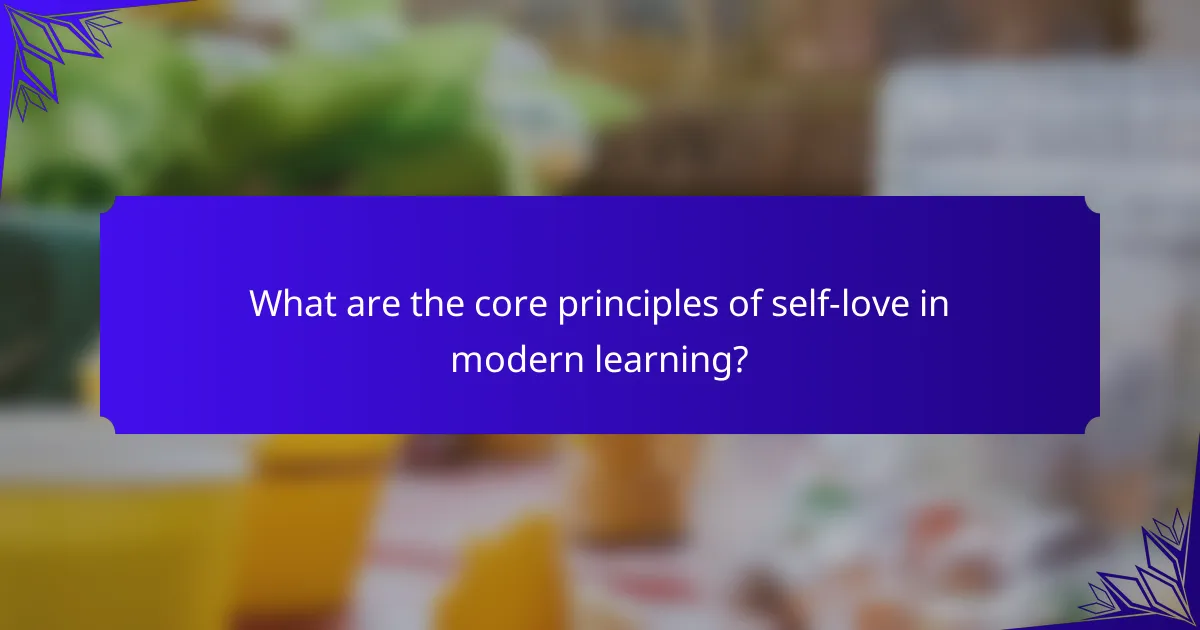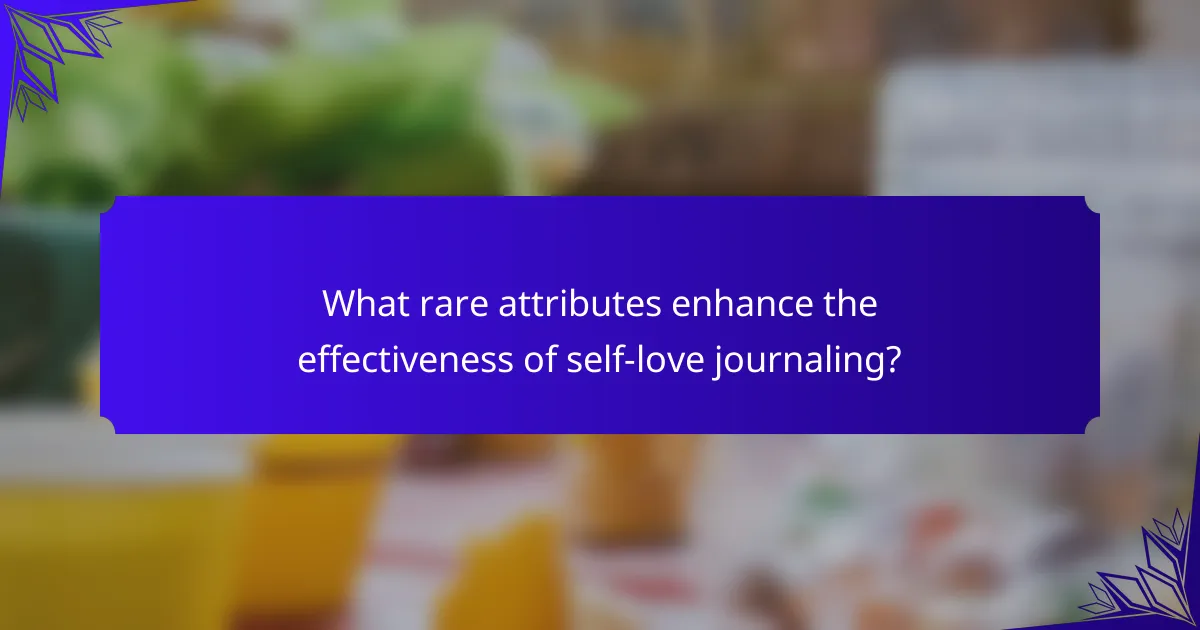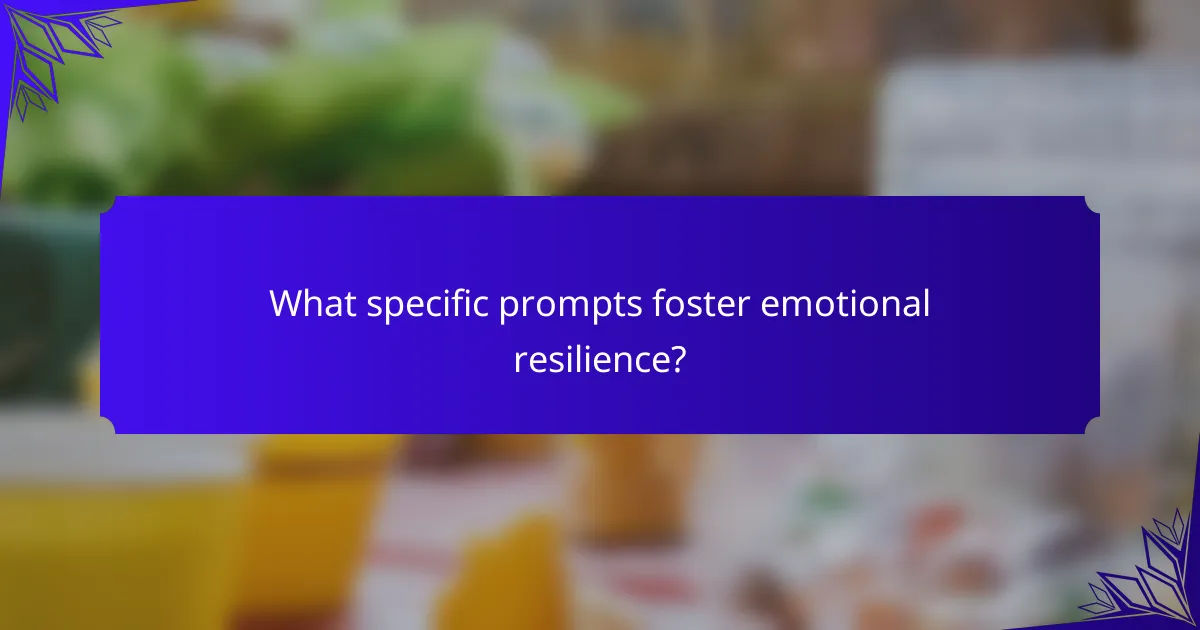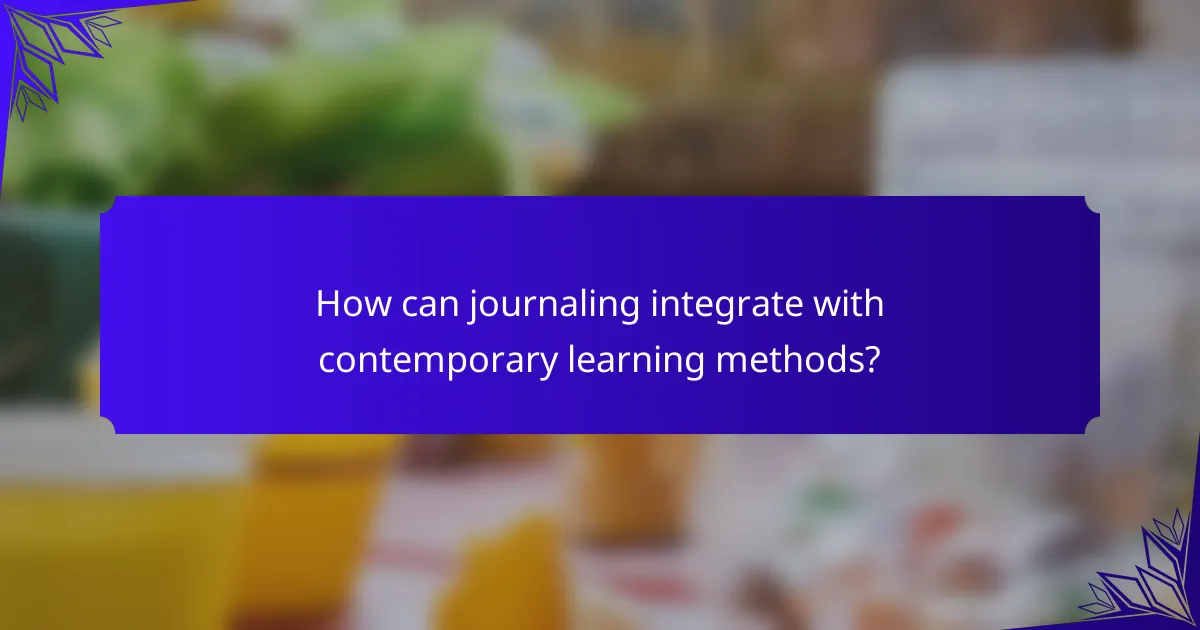Cultivating emotional resilience and mindful awareness is essential in modern learning. Journal prompts for self-love enhance self-acceptance and promote personal growth. They encourage reflection on strengths and challenges, fostering deeper emotional insights. Engaging with these prompts supports mental health and builds a resilient mindset for navigating life’s challenges.

What are the core principles of self-love in modern learning?
Self-love in modern learning emphasizes self-acceptance, emotional resilience, and mindful awareness. Key principles include practicing self-compassion, setting healthy boundaries, and fostering a growth mindset. Engaging in journal prompts can enhance these principles by encouraging reflection and self-discovery. For instance, prompts can explore personal strengths, challenges, and aspirations, facilitating deeper emotional insights and resilience.
How does emotional resilience impact personal growth?
Emotional resilience significantly enhances personal growth by fostering adaptability and self-awareness. It enables individuals to navigate challenges effectively, promoting a mindset focused on learning and development. Resilient individuals are more likely to embrace failures as opportunities, leading to greater self-acceptance. This growth mindset is essential for cultivating self-love, as it encourages individuals to practice mindfulness and reflect on their experiences. As a result, emotional resilience serves as a foundation for continuous personal evolution and deeper emotional connections.
What role does mindful awareness play in self-discovery?
Mindful awareness plays a crucial role in self-discovery by fostering emotional resilience. It encourages individuals to observe their thoughts and feelings without judgment, enhancing self-acceptance. This practice allows for deeper insights into personal values and beliefs, facilitating growth. Regular engagement with mindful awareness can lead to a more authentic self-concept, ultimately enriching the journey of self-love.

What are the universal benefits of journal prompts for self-love?
Journal prompts for self-love enhance emotional resilience and mindfulness. They foster self-awareness, promote positive self-reflection, and encourage personal growth. Regular use can reduce anxiety and improve overall mental health. Engaging with these prompts cultivates a deeper understanding of oneself, leading to increased self-acceptance and compassion. This practice supports the development of a more resilient mindset, crucial for navigating modern life challenges.
How can journaling enhance emotional intelligence?
Journaling enhances emotional intelligence by fostering self-reflection and awareness. It encourages individuals to explore their thoughts and feelings, leading to improved emotional regulation and empathy. Regular journaling can deepen understanding of personal emotions, enabling better responses to others’ feelings. This practice cultivates resilience by allowing individuals to process experiences, thus promoting mindful awareness in modern learning environments.
What are the psychological advantages of reflective writing?
Reflective writing enhances emotional resilience and mindful awareness by promoting self-discovery and personal insight. It allows individuals to process experiences, reducing anxiety and improving mood. Studies show that regular reflective practices can lead to increased self-esteem and greater emotional regulation. Engaging with journal prompts fosters a deeper understanding of personal values and goals, ultimately cultivating a more positive self-image.

What unique features distinguish effective journal prompts?
Effective journal prompts for self-love are distinguished by their ability to evoke deep emotional reflection and encourage mindful awareness. They often incorporate unique features such as open-ended questions that promote introspection, guiding users to explore their feelings and experiences. These prompts may include specific scenarios that challenge negative self-perceptions, fostering emotional resilience. Additionally, they often emphasize gratitude and self-compassion, which are essential for cultivating a positive mindset. By integrating these elements, journal prompts can significantly enhance personal growth and emotional well-being in modern learning environments.
How can prompts be tailored to individual experiences?
Tailoring prompts to individual experiences enhances their effectiveness. Personalization allows for deeper emotional connections, fostering resilience and mindfulness. Consider values, challenges, and aspirations when crafting prompts. Unique attributes like personal history or cultural context can inform specific questions, making them more relevant. As a result, individuals engage more fully, leading to greater self-awareness and growth.
What innovative formats can be used for journaling?
Innovative formats for journaling include visual journaling, bullet journaling, digital journaling, and gratitude journaling. Visual journaling combines images and sketches to express emotions, enhancing creativity. Bullet journaling offers a structured approach, promoting organization and mindfulness. Digital journaling utilizes apps for convenience and accessibility, while gratitude journaling focuses on positivity, fostering emotional resilience. Each format supports self-love and mindful awareness in modern learning.
What digital tools support modern journaling practices?
Digital tools enhance modern journaling practices by providing interactive and customizable platforms. Notable options include apps like Day One and Journey, which offer prompts for self-love, emotional resilience, and mindful awareness. These tools often feature multimedia integration, allowing users to include images and audio, enriching the journaling experience. Additionally, cloud storage ensures accessibility across devices, promoting continuous engagement with journaling.

What rare attributes enhance the effectiveness of self-love journaling?
Rare attributes that enhance the effectiveness of self-love journaling include personalized prompts, emotional triggers, and reflective questioning techniques. Personalized prompts cater to individual experiences, fostering deeper connections. Emotional triggers evoke specific feelings, guiding users toward authentic self-reflection. Reflective questioning techniques encourage critical thinking, enabling users to explore their thoughts and emotions more profoundly. These attributes contribute to a more impactful journaling experience, promoting emotional resilience and mindful awareness.
How does the timing of journaling influence outcomes?
The timing of journaling significantly influences emotional outcomes. Journaling in the morning fosters clarity and sets a positive tone for the day. In contrast, evening journaling encourages reflection and processing of daily experiences. Research indicates that morning prompts enhance focus, while evening prompts improve emotional regulation. Regular practice at consistent times cultivates resilience and mindful awareness.
What uncommon themes can deepen self-reflection?
Exploring uncommon themes can significantly enhance self-reflection. Consider prompts that delve into paradoxes, such as embracing vulnerability while seeking strength. Reflect on the concept of “anti-goals,” focusing on what you want to avoid rather than achieve. Engage with nature through prompts that explore your connection to the environment. Examine your relationship with time, contemplating past, present, and future selves. Finally, consider the theme of impermanence, reflecting on how change shapes your identity.

What specific prompts foster emotional resilience?
Journal prompts that foster emotional resilience include reflective questions that encourage self-exploration and gratitude. For instance, “What challenges have I overcome, and what did I learn?” promotes resilience by focusing on personal growth. Another prompt, “What am I grateful for today?” enhances mindful awareness, shifting focus from negativity to positivity. Additionally, “How do I feel right now, and why?” aids in recognizing and processing emotions, building emotional strength. These prompts cultivate a deeper understanding of oneself, essential for emotional resilience in modern learning environments.
How can gratitude prompts shift mindset?
Gratitude prompts can significantly shift mindset by fostering a positive outlook. Engaging with these prompts encourages individuals to focus on their strengths and achievements, enhancing emotional resilience. Regular practice leads to increased mindfulness, helping learners appreciate their experiences and cultivate self-love. Research indicates that gratitude practices can improve overall well-being, making them a valuable tool in modern learning environments.
What questions encourage vulnerability and authenticity?
Asking open-ended questions fosters vulnerability and authenticity. Consider prompts like “What do I truly value in myself?” or “When have I felt most at peace?” These questions encourage deep reflection and emotional exploration, essential for self-love and resilience.

How can journaling integrate with contemporary learning methods?
Journaling integrates with contemporary learning methods by enhancing emotional resilience and mindful awareness. It fosters self-reflection, which is crucial for personal growth in educational contexts.
In modern learning environments, journal prompts focused on self-love encourage students to explore their emotions and thoughts. This practice improves mental health and promotes a deeper understanding of oneself.
Research indicates that students who engage in reflective journaling report higher levels of emotional intelligence. This unique attribute supports their ability to manage stress and navigate challenges effectively.
Furthermore, journaling can be tailored to various learning styles, making it a versatile tool. By incorporating visual elements or creative writing, learners can express themselves in ways that resonate with their individual preferences.
What are effective strategies for combining journaling with digital learning?
Combining journaling with digital learning enhances emotional resilience and mindful awareness. Effective strategies include integrating reflective journaling apps, utilizing prompts that encourage self-love, and scheduling regular journaling sessions to reinforce learning outcomes. These methods foster deeper engagement with digital content and promote personal growth.
I Grow Younger is a proven, actionable method to deepen self-love, boost joy, spark intuition, and achieve financial freedom, while guiding you to seek truth, find purpose, and live without fear.

What best practices should be followed for impactful journaling?
To achieve impactful journaling, focus on consistency, authenticity, and reflection. Establish a regular writing schedule to build a habit. Use prompts that encourage self-love, such as “What do I appreciate about myself today?” This cultivates emotional resilience. Write freely without self-judgment to enhance mindfulness. Review your entries periodically to identify patterns and growth, reinforcing your emotional awareness.
How can consistency in journaling practices be maintained?
To maintain consistency in journaling practices, establish a routine and set specific goals. Regularly schedule journaling sessions, ideally at the same time daily or weekly. Use structured journal prompts focused on self-love to guide reflections and deepen emotional resilience. Track your progress to stay motivated and adapt prompts as needed to keep the practice engaging.
What common mistakes should be avoided in self-love journaling?
Avoiding common mistakes in self-love journaling enhances emotional resilience. Key errors include neglecting consistency, focusing on negativity, and comparing entries with others. Failing to set clear intentions can lead to aimless writing. Additionally, overlooking the importance of self-compassion may hinder progress. Engaging in superficial prompts without depth limits personal growth. Lastly, not reviewing past entries can prevent learning from experiences.
What expert insights can enhance journaling effectiveness?
To enhance journaling effectiveness, consider employing specific techniques that foster self-love and emotional resilience. Utilizing structured journal prompts can deepen self-reflection and promote mindful awareness. Incorporate prompts that encourage gratitude, self-affirmation, and exploration of personal values. Regularly setting aside dedicated time for journaling can also increase consistency and commitment. Engaging with these practices cultivates a supportive space for emotional growth and resilience in modern learning environments.


